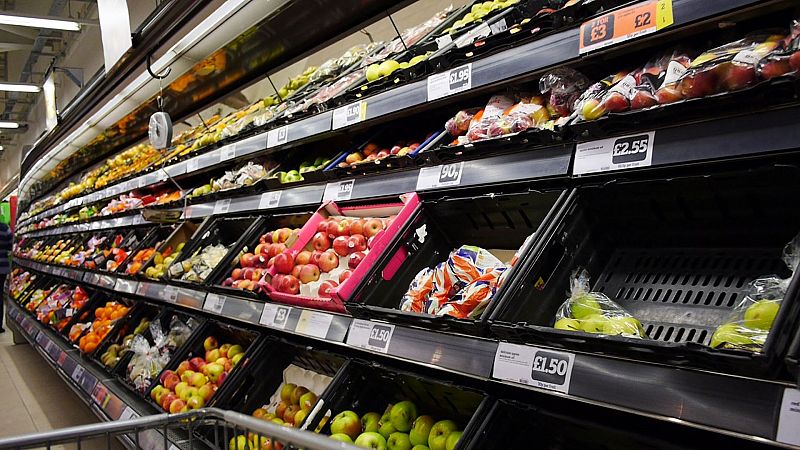Climate change and energy prices drive UK food shops up by £605 in last two years, study finds

Extreme weather and rising energy prices have driven UK household food bills up by an average of £605 (€697) since 2021, according to a new study.
Rising temperatures - and the droughts, flooding and crop failure they cause - accounted for 60 per cent of this increase, or £351 (€404) per household.
Combined with last year’s high oil, gas and fertiliser prices - prompted by Russia’s invasion of Ukraine - this has added around £17 billion (€19.6b) in total to the UK’s food bill since the end of 2021. This is the equivalent of 10 weekly shops per household.
The report from UK NGO the Energy and Climate Intelligence Unit (ECIU) comes just a week after the Bank of England warned of the impact of climate change on food inflation.
“Even as we expect food inflation to fall, there are clearly risks as we look ahead to the months and years ahead,” the bank’s governor Andrew Bailey said in a speech on 20 November. “Food inflation can be volatile in the best of days. And climate change is affecting weather patterns, increasing the risk of poor harvests.”
Rising temperatures continue to push up food prices
In 2022, both climate change and energy costs worked together to push up food prices.
This year, energy costs fell but extreme weather worsened with record-breaking temperatures experienced around the world.
The knock-on effect on agricultural production left food prices high in 2023 and showed that climate change has a more persistent effect on inflation. Its impact is also worsening, with the climate crisis adding £169 (€195) to bills in 2022 and £192 (€221) in 2023, according to the analysis.
Food inflation peaked at 19.2 per cent in March - the highest rate seen in over 45 years. It slowed to 7.9 per cent in October, but prices were around 30 per cent higher compared with 2021, according to the UK’s Office for National Statistics (ONS).
While energy prices fluctuate based on political and economic events, they are also indirectly affected by rising global temperatures.
The impact on food prices is one of the most direct effects on national economies, ECIU researchers say.
Almost half of Brits surveyed by the ONS this month said they were buying less food due to the price hikes. Earlier this year, one in 20 adults said they had run out of food and had been unable to afford more.
Climate change could worsen cost of living crisis in 2024
Going into 2024, the weather could become even more extreme as El Niño threatens to push up temperatures through the first half of the year.
The climatic event could also have drastic weather effects like increased rainfall and stronger storms.
A report from the Food and Agriculture Organization of the United Nations (FAO) stresses that agriculture is particularly vulnerable. The sector can absorb 26 per cent of economic losses during extreme weather conditions and up to 82 per cent during drought.
Shifting to more sustainable farming practises could help bolster food security by improving soil quality and biodiversity and driving down planet-heating emissions.
This year, the UK introduced the Sustainable Farming Incentive (SFI), which pays farmers for improving soil health and biodiversity and mitigating the impact of extreme weather.
The EU, meanwhile, proposed a new Soil Monitoring Law in July to protect and restore soils and ensure they are used sustainably. The European Commission is also set to propose a legislative framework for sustainable food systems soon.
Plans to slash pesticide and fertiliser use by 2030 in the EU will contribute to these goals and further shield consumers from fluctuating prices.

